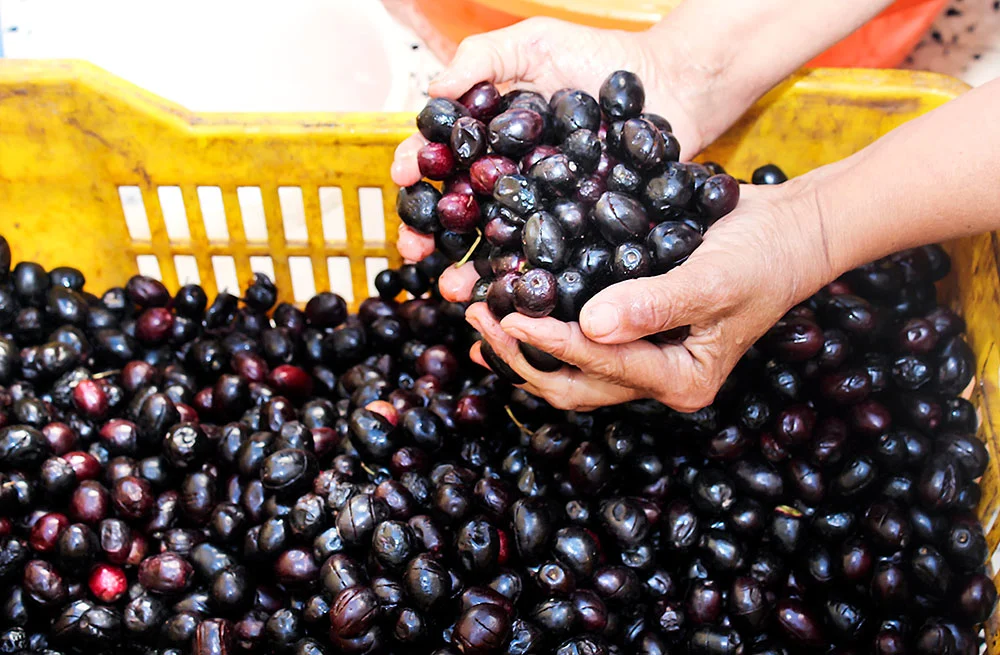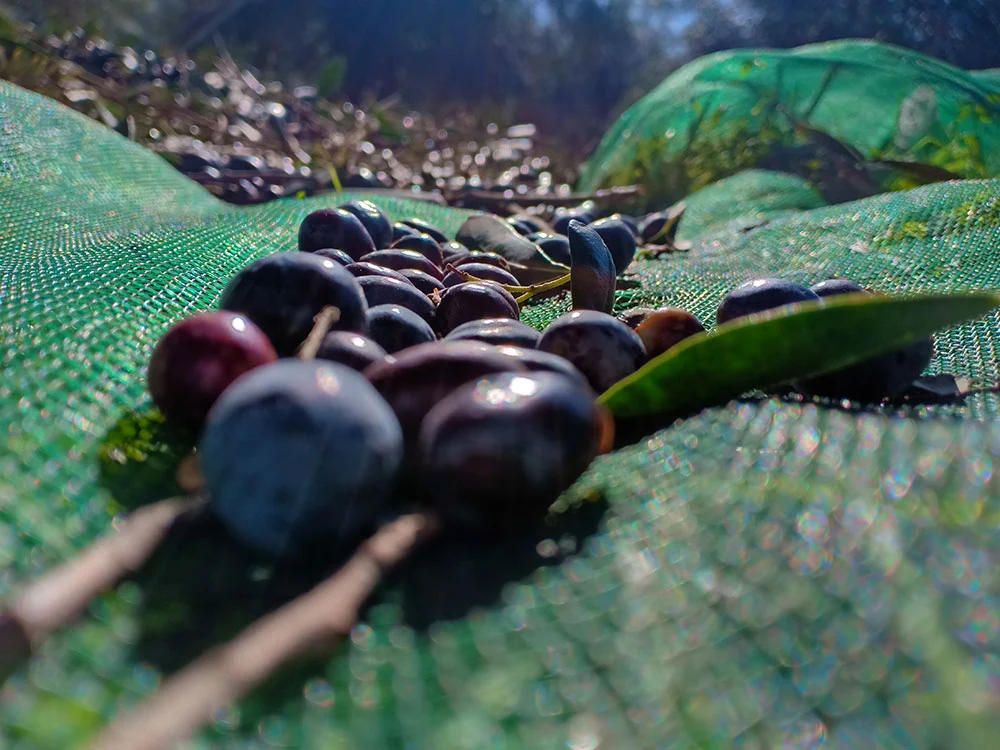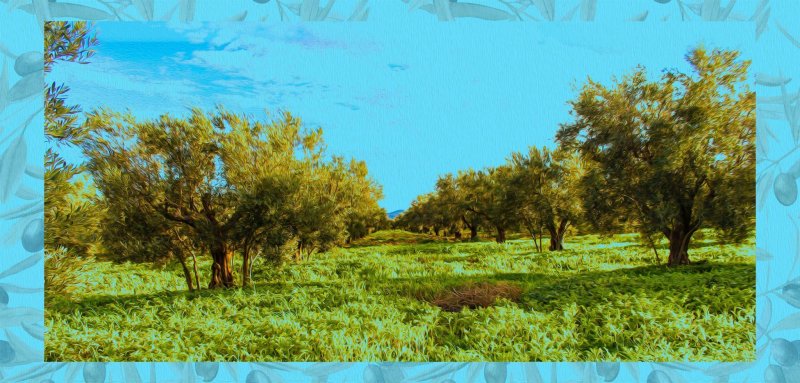"Olives yields have declined in recent years. Climate change has negatively affected crops, and not one year goes by without the next one being worse”.
With these words, Abdo began describing the current situation to Raseef22. Abdo is the owner of an olive mill in the Bouandas district in the province of Sétif in northeastern Algeria, famous for its diverse agricultural products.
The farmer explains what happened and the reasons for the decline of olive trees, saying, "In 2017 and 2018, the amount of oil pressed after the end of the harvest season reached 600,000 liters, while the amount of oil currently ranges between 200,000 and 400,000 liters per year”.
"Olive yields have declined in recent years. Climate change has negatively affected crops, and not one year goes by without the next one being worse”
Abdo says the significant decline in olive oil production resulting from the pressing of olives is likely to be due to climatic shifts due primarily to natural causes and to the forest fires that have swept Algeria in recent years.
Olive trees in the province of Tizi Ouzou, located 30 kilometers east of the capital Algiers, nicknamed the capital of "Jurjura" and "Tell Atlas" as well as the city of Zeitoun, were the most affected by the fires that swept the country in mid-August 2021, damaging more than 5,000 hectares of fruit trees, the majority of which are olive trees.
Ibrahim Talmut, a specialist in agricultural issues, tells Raseef22 that the decline in olive production in the last two decades is due to several reasons, the most important of which are the hundreds of fires recorded in rural and mountainous areas, which destroyed large areas of olive trees, most of which date back to the distant past.

Declining human interest
The statistics of the International Olive Council for the 2020-2021 season reveal that Algeria ranked third in the Arab world in terms of consumption, with quantities of about 73 million and 40 thousand liters of olive oil, while Syria ranked second in the Arab world, with an estimated total consumption of 85.3 million liters.
Ibrahim Talmut believes that “Algeria can raise its production during the olive harvest season to about two billion liters per year, in the case of optimal exploitation of the vast lands and the construction of a press in each village. A project such as this will provide thousands of jobs, and this blessed tree may be an alternative to black gold (petroleum).”
The decline in olive production in the last two decades is due to several reasons, the most important of which are hundreds of fires that destroyed large areas of olive trees, in addition to climate changes and the lack of rain in semi-arid areas
Hakim, an olive farmer in Draâ El Mizan, a district of the Tizi Ouzou Province, famous for producing the finest olives, has a different opinion. He tells Raseef22, "This is not only due to the changes in climate in Algeria, but also to the noticeable decline in interest in the olive tree, which is reflected in the quantity of annual production.”
He goes on to say, “The olive tree is susceptible to several fungal, insect, or bacterial diseases, which usually target the stem, leaves, or fruits and causes the produce to decline and its quality to deteriorate, especially since it spreads rapidly and moves from one field to another. To fight these types of bacteria that penetrate the tissues of fruits through openings, farmers need fertilization in order to provide the necessary nutrients like nitrogen, phosphorus, and potassium, and each tree needs fertilization based on its age, while the amount of fertilizer varies from one tree to another.”
He continues, "As a result of the difficult financial conditions, most farmers in the region overlook implementing fertilization and irrigation. The olive tree, even though it is known for its resistance to drought and even the ability to face arid environments, needs additional quantities of water to improve the quality of oil and the amount collected annually, and the irrigation phase usually starts in February and continues until the beginning of November, and the appropriate timing for irrigation is in the late afternoon or in the early hours of the morning so that the fruits are not affected."
Hakim concluded by strongly criticizing the significant negligence of olive oil production in Algeria, despite the fact that it wins first places in international competitions where major international brands compete in this field, and said that "the price of a barrel of olive oil exceeds the price of a barrel of petrol oil, so why not distribute land to young people and encourage them to plant olives?"
Due to difficult financial conditions, most farmers overlook implementing fertilization and irrigation
Different varieties
Boubaker Saudi, one of Algeria's leading producers and exporters of olive oil, tells Raseef22 that this season's crop expectations remain lower than previous seasons, mainly due to several reasons, most notably the heat wave that hit the country during the blooming phase of the olive tree, and the bad weather conditions that significantly affected the quality of the fruits. He points out that the rate of decline in production at the national level may reach 60%.
He continues, "Olives are one of the most prominent agricultural products in the country, and there are different types of it, the Kabylia region produces a type called 'Shamlal', which is good and has the characteristic that it’s not self-pollinated, while the Hautes Plaines region is famous for producing the 'Azraj' variety, an arboreal plant belonging to the olive family, which is an evergreen oil plant. Meanwhile the eastern Algerian region is famous for producing the 'Verkani' variety, which is the most drought-tolerant olive and at the same time the most excellent oil producing species in the world."
In order to expand the areas of olive tree planting, Boubaker Saudi stressed the need to provide support to farmers, encourage the export of this vital product, and urgently intervene to find field solutions to the water shortage crisis in order to irrigate hundreds of hectares of land and agricultural areas.

Lack of support
In the International Premium Olive Oil Competition organized in Dubai, United Arab Emirates, an Algerian olive oil producer from the district of Aïn Oussera (a district of Djelfa Governorate about 300 km from Algiers) won for the second time in a row. Hakim Alileche, the owner of the "Dahabia" brand, received a gold medal, the second of its kind, on July 30, for the same product.
Algerian olive oil has previously won the gold medal in the Health Product Claim category in the London International Olive Oil Competition (LIOOC) 2022, through the "Aulisua" olive oil brand of "Bio Lalla Meriem" company in the city of Oran, on the west coast of the country, and won 4 awards in the 19th International Competition for World Oils, organized by the Agency for the Valorization of Agricultural Products (AVPA) in Paris, on May 2021.
Olive oil must have its own district office tasked with developing the oil sector. It would act as a link between the producer and the consumer, entrusted with collecting all olive oil, then classifying and marketing it in the local market or exporting it abroad
Arzuki Tawdart, head of the National Committee for Olive and Oil, stresses that Algerian olive oil is one of the finest oils in the world, and is a strong competitor in the international market because it contains a high percentage of vitamins and saturated fatty acids and is characterized by delicious flavors.
However, this division still suffers from several shortcomings, including, as Tawdart tells Raseef22, the lack of physical and chemical laboratories, and the lack of an integrated industrial dynamic that can enter this product strongly into the field of import. The spokesman goes on to say, "Olive oil must have factories just for the manufacture of glass bottles for oil, as most Algerian producers import bottles from Tunisia to pack this product."
He lists the remaining obstacles represented in the need to replace traditional presses with modern ones in order to obtain high-quality oil, and also addresses the lack of professional cadres for the olive division, which can contribute to facilitating and supporting the export process.
Therefore, the expert believes that olive oil must have its own district office tasked with organizing and developing the oil sector. It would act as a link between the producer and the consumer, and would be entrusted with collecting all the olive oil available at local olive presses, then classifying and marketing it at the level of the local market or exporting it abroad, and it is worth noting that all countries that are famous for the production of this oil have a special district office for olive oil.
According to official figures revealed by the president of the Algerian Association for Olive Cultivation and Cultivation, Said Bakhtawi, in an interview with state radio, Algeria has more than 68 million trees, but they do not produce more than 15% of their capabilities due to the lack of technical capabilities, as well as their presence in high areas, which exposes them to ice and frost.
Raseef22 is a not for profit entity. Our focus is on quality journalism. Every contribution to the NasRaseef membership goes directly towards journalism production. We stand independent, not accepting corporate sponsorships, sponsored content or political funding.
Support our mission to keep Raseef22 available to all readers by clicking here!
Interested in writing with us? Check our pitch process here!



